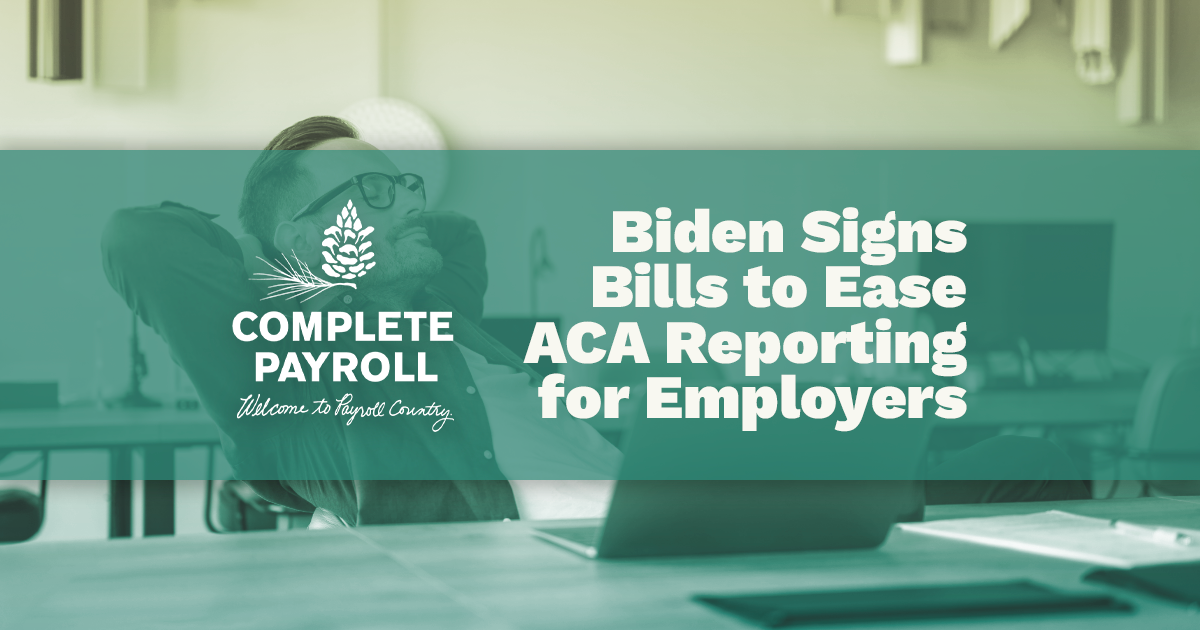Best Practices for Managing the Annual ACA Reporting Process
Written by Joe Peluso
.jpg?width=1920&name=Complete%20Payroll%20Blog%20Photo%20(7).jpg)
If your HR department has ever expressed frustration or even exasperation over ACA reporting, you are certainly not alone. As an HR and payroll company, we work with companies across numerous industries, and we have heard this same question from client after client: how can we make sure that we’re getting EVERYTHING right when it comes to mandated ACA reporting?
The basics of ACA reporting are pretty straightforward: it is the responsibility of every employer with 50 or more employees to report information to the IRS regarding what healthcare coverage they offer to their workers.
Unfortunately, implementing the necessary reporting processes is much more complicated and challenging. Additionally, costly penalties are applied to companies who make mistakes or report their information too late.
We want to share what we have learned about ACA reporting over the years. After managing the ACA reporting for countless companies, we have put together a list of best practices that anyone should follow.
1. Confirm your reporting obligations.
The first step to avoiding penalties is to confirm your obligations.
Any business or organization with an average of 50 or more employees is considered to be an Applicable Large Employer (ALE). ALEs must file the following forms: 1095-C (Employer-Provided Health Insurance Offer and Coverage) and 1094-C (Transmittal of Employer-Provided Health Insurance Offer and Coverage Information Returns) no later than February 28th each year. (If you file electronically, you have until March 31st).
Some companies with fewer than 50 employees may need to report as well. It comes down to whether or not you are self-insured. Small self-insured businesses must file form 1095-B and the 1094-B transmittal form.
Meanwhile, companies with fewer than 50 employees that are not self-insured have no filing obligation.
2. Automate what you can & invest in the right technology.
Software companies have developed a lot of ACA compliance solutions over the past few years. Investing in the best technology available will certainly help you save time.
Some companies choose to use dedicated ACA reporting software that integrates with their other platforms, while others choose an HR package that includes ACA reporting as just one component of many.
Keep in mind, of course, that technology is one of those areas where “you get what you pay for,” meaning that more budget-friendly options may not be as user-friendly or as effective. Some businesses choose to outsource their HR tasks and ACA reporting because it makes more budgetary sense than paying for expensive software that must be implemented.
3. Work ahead and do not fall behind.
One of the worst things you can do is to let yourself fall behind in ACA tracking and reporting. Waiting until the last minute before the filing deadline increases your chances of making mistakes or filing late.
4. Exercise caution regarding sensitive health information.
Personal Health Information (PHI) is protected by HIPAA. Because you are reporting information about your employees’ use of healthcare services to the IRS, you may be dealing with HIPAA-protected PHI.
In most circumstances, employers are not interacting with PHI while fulfilling their ACA obligations. However, treating worker information with appropriate caution is vitally important for employers. Confirm whether or not any of the information you are collecting could be categorized as PHI, and if so, be sure to provide appropriate training to any worker who might be handling PHI to prevent unauthorized use of this information.
5. Protect your data.
Even if you are not collecting PHI, you are still collecting personal information that needs to be protected. When you are collecting and documenting things like employee names, social security numbers, addresses, salaries, and dates of birth, you have an obligation to keep that information secure.
Prioritizing data security is about developing a comprehensive strategy that includes:
- Employee training to help them avoid scams
- Software integration to protect your data
- Good relationships with vendors who also prioritize data protection
- A response plan in the event of a data breach
6. Know that it is okay to ask for help.
It is okay to ask for help when you need it! Not every employer has the means, energy, time, or resources to dedicate to getting the whole process right--and that is okay. The beginning of this post said that you are not alone if you are experiencing corporate headaches from managing your ACA reporting process.
You do not have to struggle with ACA reporting. There are so many resources available to help you! The IRS can provide you with a lot of information. Bringing someone onto your team with lots of ACA compliance experience is another great strategy. You may also want to outsource the process altogether because then you can hand off the responsibility to a dedicated compliance professional with plenty of experience and expertise.















 Get Instant Blog Notifications
Get Instant Blog Notifications

.jpg)